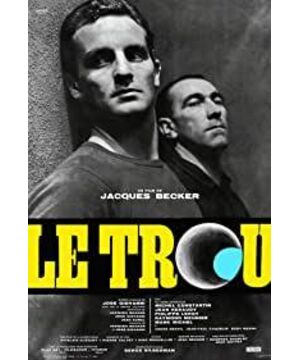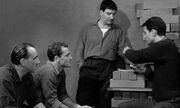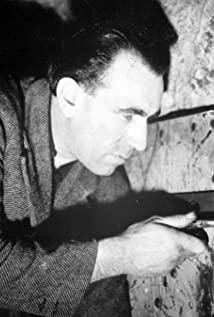If it is assumed that "The Hole" is not a cheap sensory thriller of the kind that builds suspense with suspense and narrative shenanigans, then it must be admitted that the conjecture that Rowland is the whistleblower has little in the narrative context of the film. Unfounded. The director uses the theme of "prison break" to satirize a class of well-educated and refined egoists. This hidden demand needs to be understood in the context of the purge movement during the post-World War II French recovery period.
Jacques Becker (1906-1960) directed few films, and Le trou (1960) was his last and most popular. This is a very wonderful narrative film. The plot is suspenseful, the characters are portrayed, the rich expression of the psychological conflict of the characters in the lens language, and the text narration are all remarkable. The rejection of music is also a feature of the whole film.
At the beginning of the film, a chizi is inserted, a car mechanic (we later know that he is called Roland Dabant in the film) directly facing the camera, explaining the origin of the film in a few words, so that the audience knows: It's a story that happened in Santé Prison in France in 1947; it's a story about this man; it's Jacques Baker who made this man's story into a movie. After that, the camera shuttles directly to Santé Prison in 1947, neatly.
This beginning is not as superfluous as it may seem, at least it supports a hidden appeal. Its paradoxical existence (the reality of the story created on the surface and the actual weakening of the reality) has the effect of suggesting that the audience is distanced from the text - which helps the audience to examine and discover the director's implication appeal in this narrative. At the same time, it also hinted at Roland's "outsider" status in advance from the moral judgment of the film's story.
The five main characters of the whole film, the five prisoners in Cell No. 5, appeared in succession soon after, and their characters and images were successfully portrayed, and it is no exaggeration to describe them as full and powerful. They are: the mild-mannered Claude Gaspard, jailed for "attempted wife's murder" and facing perhaps more than 10 years in prison, the new occupant of cell 5; the confident and sophisticated Roland De Dabante, this sly, imaginative, and steady guy is the bike mechanic in Qizi. He had a legendary experience of three successful prison escapes before. Organization, as for what happened to him between the previous successful escape and his current imprison, it is not explained in this story; the reckless and careful Manu Burri, he has a firm look and Cute, childish smile; Worselin looks older, he looks very scheming, nicknamed "Your Excellency" perhaps because of his priestly family background, and we don't know anything about him; slack Gio Cass De, probably the oldest resident in Cell No. 5, he is clumsy at words, often embarrassing because his words are too direct, but after getting along with him for a long time, the inmates don't take it seriously. With a sentimental heart, the only thing he cared about was the mood of his elderly mother. Apart from this, nothing could inspire him to have hope for the future, including the temptation of freedom.
"The Hole" has the typical technical details of a prison break film in its plot. Compared with Bresson's "Dead Man Escape" (1956) and later "The Shawshank Redemption" (1994), "The Hole" did not spend a lot of money. Kung Fu creates a tense atmosphere, but it has a light comedy flavor. The details are subordinate to the need for drama, have rationality, and be able to justify themselves. Various shots are used alternately, and the actor's psychological conflict is successfully conveyed through medium and close-up shots and close-ups. Overall, the film's narrative is concise and powerful.
As a prison break-themed movie, as far as the audience usually has preconceived notions about it, its interpretation path is to show a "successful paradigm" of escape from a tiger's mouth, a release of passion for freedom, thereby touching the hearts of the audience. In fact, most of the previous content of "The Hole" has not gotten rid of this rut, and experienced audiences may feel a little uneasy because of its lightness and fullness. This unease is confirmed at the end of the film, when the director deviates from the audience's emotional concern with a dark humorous reversal, pointing to why the escape failed? In this regard, "The Hole" is quite unique among prison break movies. The reason why the film is named "Hole" is also here: the most difficult thing to overcome is not the various physical obstacles that block the layers, but the black hole of the human heart.
This movie has been on the list for a long time, because Y recommended it on WeChat, so I watched it specially. After reading and asking Y, I found that his views on the ending are different from mine. I went to the forum and saw some people's discussions about who the whistleblower was. Many people thought that the whistleblower was Roland. The reason makes me think that in this uncomplicated film text, this kind of "conspiracy theory" interpretation - such as thinking that the whole thing is a trap set aside by the warden's plan, or that Roland is asking himself A "deal" between Paul and the warden - fell into the misunderstanding of the so-called "scavenger hunt" that probably caused the momentum of Hollywood movies. According to this interpretation, although the commentator can list some so-called "evidence" or psychological analysis to prove its rationality, at the same time, it also leaves more "irrational" ignored in this interpretation mode. sex” and sever the inner unity of the film (expressed in the plot and character of the characters). Although in a sense, the meaning generation of the text is the result of the cooperation between the reader (audience) and the author (director). , when making such interpretations, the separation from the internal consistency of the text should be avoided, and a reasonable interpretation of the director's own intentions is also necessary.
Aside from too many associations between this film text and real life, in terms of the narrative function carried by each scene of this text, the informer is obviously Gaspard. An excellent movie will not waste every scene or stack some useless scenes, that is to say, each scene carries a certain narrative content, and all scenes do not violate the rational relationship between them On the basis of the narration, they jointly constructed the overall appearance of the narrative. Regarding the conjecture that Roland is a whistleblower, although it is not impossible to discuss from the perspective of complex reality, when it comes to this text, the interpretation must be established based on the content shown in this text. In this regard, the text really lacks anything that can reflect or even suggest that Rowland is a whistleblower, not to mention that the film begins with a seemingly superfluous pact that asserts his morally "outsider" nature from the point of view of Rowland's subject, and , once this is admitted, it must also be pointed out that those details that reveal that Gaspard is a whistleblower in narrative logic are all useless or want to hide. If it is assumed that "The Hole" is not a cheap sensory thriller of the kind that builds suspense with suspense and narrative shenanigans, then it must be admitted that the conjecture that Rowland is the whistleblower has little in the narrative context of the film. Unfounded. Secondly, many details in the film, in the form of rich psychological interpretation, all explicitly or implicitly point out that the informer is Gaspard. It strikes people not so much because the designation is ambiguous, but more because the audience has a structured narrative cognition (fixed cognition) of the prison escape theme. Indeed, Jacques Baker avoids the naive stereotypes in his portrayal of the character Gaspard, and the personal narrative strategy he establishes is more likely to inspire sympathy and empathy in the audience. , so the hypocritical, egoistic and despicable moral image of the whistleblower in the whole picture of the incident seems to be somewhat out of tune with the pleasant and gentle image, but this does not violate the reality. Often the twists and turns are deep and deep, if not for these, the movie would have lost a lot of charm or even completely lost its charm and thought-provoking thinking.
Strip away the emotional allure of this narrative strategy, and go back and examine the reasons for the traitor's imprisonment. Leaving aside any rhetoric, the facts can be stated as follows: the traitor is a Phoenix man whose parents died early, and he later climbed to the third year of his junior year. A rich girl aged 10, he cheated with his sister-in-law and was discovered by his wife, causing a quarrel. He accidentally shot the latter and was convicted of attempted murder and imprisoned. Under pressure from the inmates, he admitted that he was relying on this woman for a living, and he did not give a reasonable explanation for the fact that he filled three shotguns with bullets. (Some people explained that it was the police who killed the dirty, the imagination was too rich, and the possibility of reality ugliness was substituted into the interpretation of the film. The film never hinted at the scenes that produced such motives from beginning to end.) These moral flaws about him are hidden in the right The character's muted portrayal, from the background, hints at the character's questionable moral stance. If the whistleblower is someone else, this background account of the character Gaspard is obviously incongruous.
From the scene where he talks to the warden at the beginning (and the warden talks to him later), as well as many detailed descriptions, it shows that Gaspard is well-educated, and it must be admitted that he started Supporting jailbreak is for a sincere purpose (considering his own interests), he started to waver from the visit of his lover, and then he himself went to the wrong cell because of his inner excitement, it was because the visit of his lover Nickel let him watch It was a realistic possibility for his wife to withdraw the accusation, but due to experience, he did not fully believe it. It wasn't until later, when he recovered this information from the Warden's (official) talk, that he believed in the possibility. This psychological turning point was the beginning of his betrayal of his inmates. The contradiction reflected in its turning point is that when he is convinced that the situation is extremely favorable to him, he is likely to be released from prison immediately (at most, he makes a compromise with his wife, which is also an attitude, not to mention that he is morally wrong. Once he participates in the escape, he will bear the psychological shadow and real dilemma of the fugitive for life. If he fails to escape and is recaptured, he will have a new charge and the court will completely lose trust in him. Even if his wife withdraws the lawsuit, he will not be free. . The most favorable outcome to weigh is, of course, the whistleblower. Of course, a well-educated person like him is delicate and sensitive at heart, and there must be a moral and self-serving struggle in making this transformation, and in the end, in the warden's inductive talk, he completely abandoned his moral responsibility , betrayed his fellow inmates, and revealed to the warden and Pan the escape plan that took place in his cell. The film does not address this directly, but from the warden calling the building chief to talk with him, the building chief coming back with him, and the details of his previous obedient and proactive behavior (that was already convinced that he would soon be free) The external revelation of the fluctuations in his heart), all supported this, otherwise this conversation would not have taken two hours. His explanation to his fellow inmates was that in the best case scenario he would have to serve five years in prison, which was a complete lie.
The theme of prison break is just a shell. The director uses this shell to satirize a class of well-educated and refined egoists, and uncover the moral veil of the tenderness and tenderness on the surface of such people. This hidden appeal needs to be placed in France after World War II. It can be understood in the context of the purge movement during the Restoration period, especially for the group of intellectuals. During the recovery period in France after the end of World War II, a nationwide campaign of liquidation and purge against collaborators and collaborators during the Vichy regime and the German occupation was launched, and this movement was particularly powerful in intellectual circles. The actual actions of many French intellectuals during the German-occupied resistance movement were not what they claimed after the war, and quite a few of them were insincere or even deceitful. In connection with this background and the expression mode of "The Hole" in content, why is the situation set in 1947 for this film made in 1960 (it seems that there is no need to express it in the past tense, or it can be completely diluted Time and space background), it is understandable that "The Hole" can be seen as a response to the eradication movement of intellectual circles, many people betrayed their conscience and responsibilities out of self-protection or fame and fortune. The reflection and irony of the collective injustice of factions and power struggles may be a hidden appeal of the film. At the end of the film, Roland's meaningful words, "Poor Gaspard!" is probably the director's helpless assertion to these deceitful people. For a cultural study of this history, see Tony Judt, Past Imperfect: French Intellectuals, 1944-1956.
View more about Le Trou reviews











